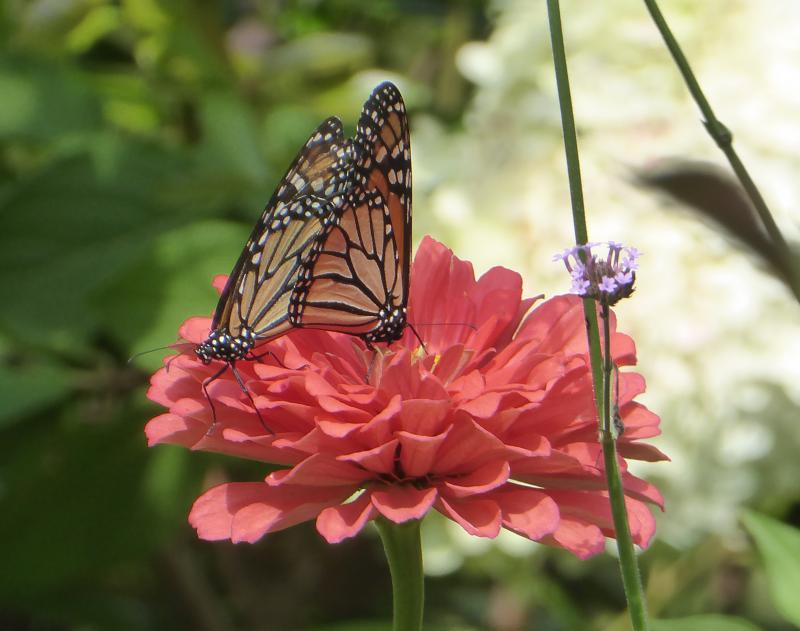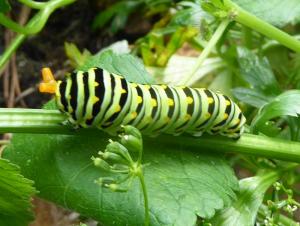Mill Pond Garden will welcome guests to enjoy the beauty of autumn nectar plants for pollinators during its open garden day from 10 a.m. to 1 p.m., Sunday, Oct. 11, at 31401 Melloy Court, Lewes. To request a ticket or more information, go to www.millpondgarden.com.
The garden will be at end-of-season peak for many glorious annuals including its large morning glory vines. Visitors can learn how to make a welcome habitat for pollinators in autumn when they most need nectar to survive winter cold.
Director Michael Zajic said, “A garden can be beautiful for both humans and our friends the insects we depend on for life on earth.”
Like them or not, insects are necessary to other animal and plant life. Insects pollinate flowers and are the main source of food for most birds and a great many other animals. Insects process and recycle all the wastes of the planet - dead trees and leaves, dead bodies, animal wastes, and more. Humans’ survival depends on the survival of abundant insects as a key to many other forms of life.
Some 37 percent of insect species have disappeared in the past 40 years, mostly from loss of habitat and insecticide use. University of Delaware entomologist and author Doug Tallamy has referred to the country’s grain croplands as “an insect desert.”
Zajic said, “The chain of life is only as strong as its weakest link, and native insects, especially pollinators, may be that weak link.”
Every homeowner, farmer and property owner can make a difference for insect survival by making or preserving habitat for them. Cut back on chemicals. Leave wild and native weedy areas alone, especially hedgerows. If the 27 million households with yards in America each planted a native tree that hosts abundant caterpillars and insects, such as oak and wild cherry, it could make a huge difference for bird life. Plant some native perennials and some non-native flowers that benefit insects, especially the pollinators – bees, butterflies and others.
Gardeners and farmers can help save the future. State maintenance crews could stop spraying tax ditches and roadside weeds, which are vital to survival of butterflies and insects. Many common weeds such as thistle, violets, nettles, plantain, clover and some grasses are hosts to butterfly caterpillars. Without these weeds, many butterfly species cannot reproduce, since those are the only plants their caterpillar babies can eat. Hedgerows are heaven for insects and the wild plants they need. Homeowners might consider finding sunny corners in their lawns to devote to native weeds, like a mini-meadow.
All insects are dependent directly or indirectly on plants. When plants are reduced or eliminated, diversity diminishes, and the abundance of insects collapses. With the removal of more than half of the forests on earth, insects have declined globally by at least 45 percent since 1979, according to some reports. With insect declines, bird populations dwindle. A 2016 State of the Bird Report said that more than 430 bird species in North America are decreasing so rapidly that they are now considered at risk of extinction.
Thinking of insects as food for birds, amphibians, reptiles and mammals can help one can start to understand the ecological significance of insect declines and why they must be reversed. The 200 species of native bees in Delaware providing pollination to countless species of wild trees, shrubs and flowers will thrive if gardeners provide some of their need for nectar in fall.
To plant for insects, birds and wildlife, homeowners can try the National Wildlife Association’s Wildlife Habitat Program, or Delaware’s equivalent program, in their yards. Many non-native plants with nectar are a happy addition for the Cape Region’s native insects that enjoy them. Gardeners can use both native and beneficial non-native flowers and plants with good conscience and good results for insects.
Plants recommended by Mill Pond Garden for providing nectar in autumn include: Solidago Goldenrod, Salvias, Dahlias, Purple Hyacinth Bean, Scarlet Runner Bean, Dill, Cosmos, Zinnias, African Blue Basil, Morning Glory, Phlox, Cleome, Clematis, Mint, Cornflowers, Hellebores, Parsley, Boltonia, any kind of annual or perennial Sunflowers, and Asters, especially the native Symphyotrichum species of which Mill Pond Garden will offer starts.
Mill Pond Garden at 31401 Melloy Court, Lewes, is a sustainable, holistic, public garden designed as much for wildlife as for people’s enjoyment. It is a National Wildlife Federation Certified Wildlife Habitat.
























































